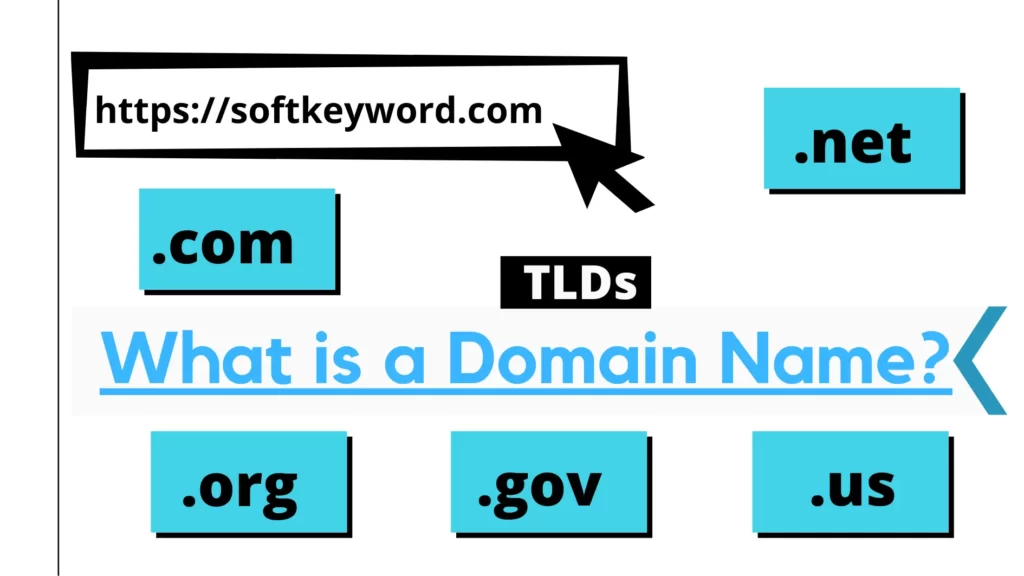Domain expiring! how to renew domain name?
Don’t lose your website! Renew it quickly in simple steps.
This guide will show you exactly how to renew a domain name and ensure your online presence stays safe and sound.
Renew your domain with confidence in the simple steps that I have followed!
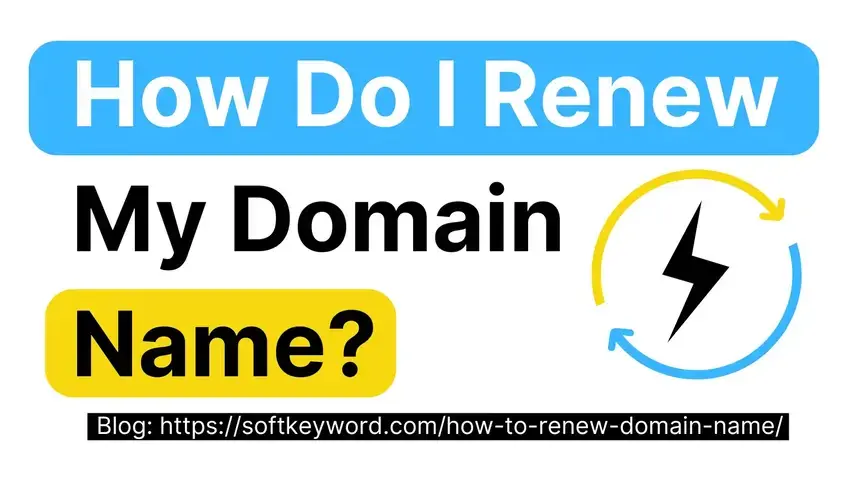
First, let’s see if you really need to renew your domain.
Do You Need to Renew A Domain Name?
You might be wondering…
Why is renewing my domain name important?
I think it’s a simple way to keep a solid online presence.
And yeah, there are more reasons for this.
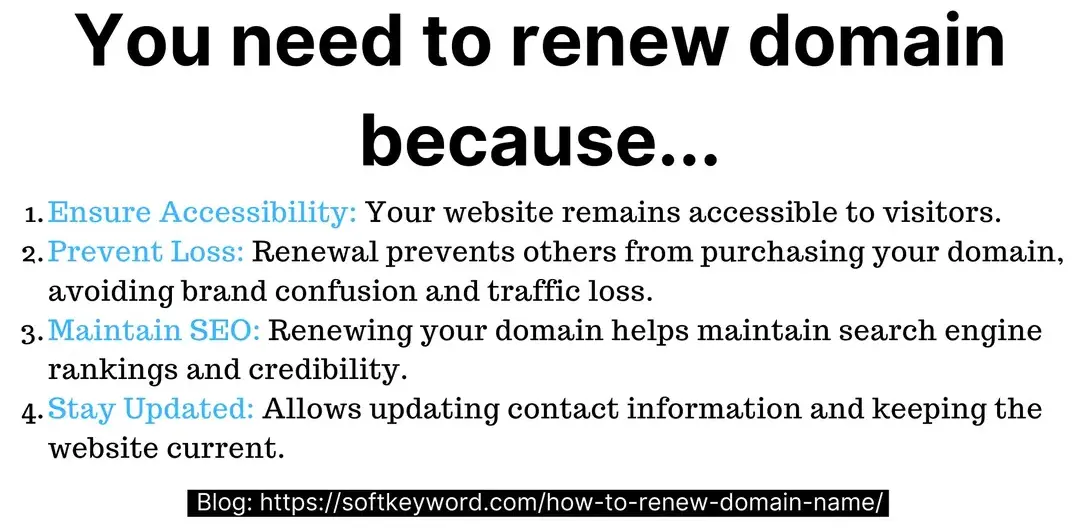
- It ensures that your website is accessible to your visitors.
- If you forget to renew it, someone else could swoop in and purchase your domain, which leads to potential brand confusion and traffic loss.
- Also, if you renew your domain name, it can help you maintain your site’s search engine rankings and credibility.
- It also allows you to update any contact information or make necessary changes to keep your website up-to-date.
Overall, renewing your domain name is a simple yet essential task that can prevent significant headaches.
So sit 🪑 comfortably.. .😀
Did you know the domain expiration rate?
Approximately 2% of domains expire annually.
(Source: Verisign Domain Name Industry Brief)
Can I renew my domain name before it expires?
You have the option to renew your domain name at any time before it expires. It’s a good idea to renew early for a few reasons:
- Convenience: You can avoid the stress of waiting until the last minute.
- Cost-effectiveness: You can pay the standard renewal fee instead of any potential additional charges.
- Security: Prevent others from swooping in and claiming your domain.
Can I renew my domain name after it expires?
Yes, in most cases, you can renew your domain name even after it expires. However, there are a few things you should keep in mind.
And that is the Domain Name Renewal Grace Period.
So let’s see about this…
Check Domain Renewal Grace Period to catch domain before it goes
So, the grace period might be a new word for you if you renew your domain name for the first time.
- The grace period is when your domain expires; you can renew it before it’s publicly available.
- The length of this grace period varies depending on your domain registrar and the specific top-level domain (TLD) of your domain name, like [dot]com or [dot]org.
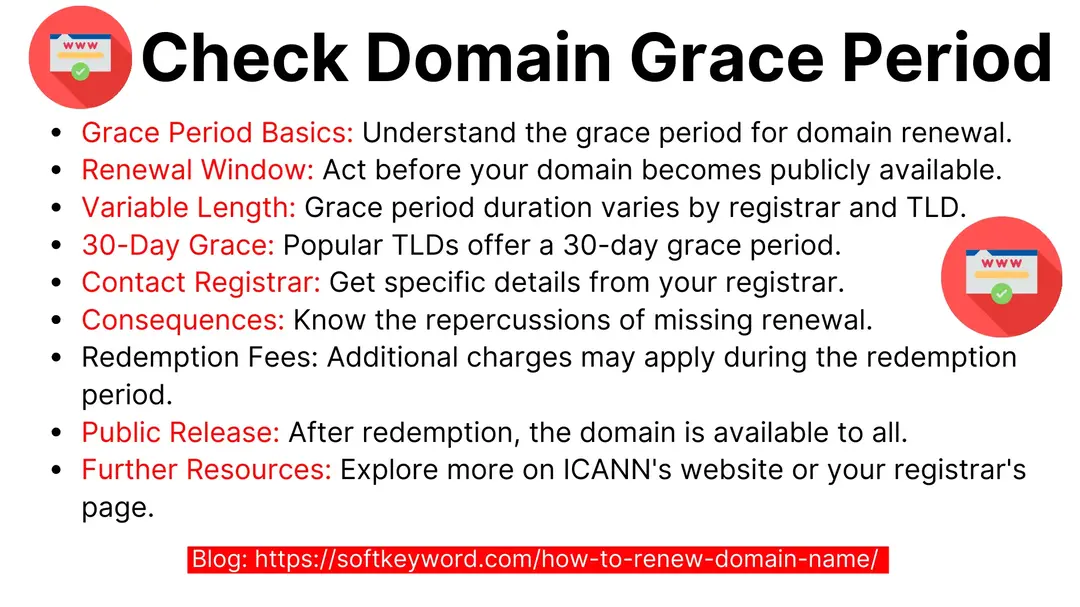
Here is a look at the typical grace period:
Most popular TLDs, such as [dot]com, [dot]org, and [dot]net, usually give you a 30-day grace period after the expiration date to renew your domain at the regular rate.
However, some TLDs may have shorter or longer grace periods.
It’s crucial to contact your domain registrar to get specific details about your domain.
What happens after the grace period?
Or what happens if you don’t renew your domain name?
Well, it will undoubtedly enter a redemption period if you don’t renew your domain within the grace period.
You may still be able to renew it at this time.
But there is a catch: You’ll likely have to pay an additional fee. After the redemption period, your domain will be released to the public, and anyone can register it.
Here are some resources you can explore for further information:
Your domain registrar’s website usually details domain expiration and renewal grace periods.
If you need more information on various top-level domains (TLDs), you can visit ICANN’s website at https://www.icann.org/.
Aware yourself from Common Mistakes To Avoid When Renewing A Domain Name
There are some mistakes I used to make when I renewed my domain name.
So you should be aware of that.
Here are some common mistakes you should avoid when renewing your domain name:
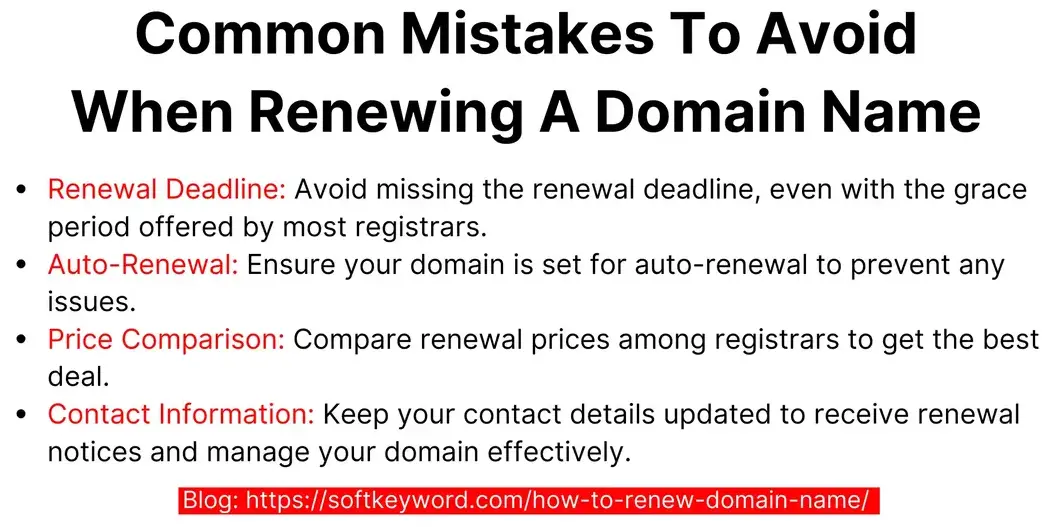
- Missing the renewal deadline: Most registrars offer you a grace period to renew after expiration, but it’s best to avoid it.
- Auto-renewal issues: Double-check your auto-renewal settings to ensure that your domain is set to renew automatically.
- Not comparing prices: Domain renewal prices can vary between registrars.
- It’s always a good idea to compare prices before renewing.
- Updating the wrong contact information: You must ensure that your contact information, including your email address, is up-to-date.
- You must receive renewal notices and communicate them to domain management.
Renewing A Domain Close To Its Expiration Date Vs. In Advance
Let’s see what happens if you renew your domain on time or close to the expiration date.
| Benefits of Renewing Your Domain Name On Time. | On the flip side, renewing close to the expiration date has drawbacks. |
|---|---|
| Renewing your domain early has its perks! | There’s a risk of missing the deadline and losing your domain. You might also pay extra fees, like a redemption fee, during the grace period. |
| It’s super convenient: you do not need to stress out at the last minute. | And let’s be honest: scrambling to renew at the last minute can be stressful. |
| Plus, it’s cost-effective with the standard renewal fee. | |
| And remember, security: renewing early prevents others from swooping in and claiming your domain. |
So, why not save yourself the hassle and renew early?
Before renewing a domain name, you should be familiar with domain renewal scam tactics to be safe. So, you want to look at domain name renewal scams.
Be aware of Domain name renewal scams
The thing is, don’t Be Fooled by Domain Renewal Scams.
Domain Name Squatters or Cybercriminals may target expiring domains for resale at inflated prices. (Source: FBI Public Service Announcement, https://www.fbi.gov/privacy-policy.)
Scammers are constantly trying to trick domain owners with phony renewal notices to steal money and possibly even your domain.
Here’s a common tactic they use:
Here is a Case Study: A company recently received a letter from a company they didn’t recognize, warning them about their domain name expiring soon. The letter stressed the importance of renewing quickly and mentioned a higher renewal fee than usual.
Source: https://www.linkedin.com/pulse/why-am-i-dollars-letters-domain-renewal-julie-spain
Data: No concrete data is available on the number of dollars scammers make from domain renewal scams. However, given how common these scams are, it’s safe to assume that the amount is substantial.
Just a heads-up
- You must be cautious of any unexpected emails or letters regarding domain renewals.
- Make sure to double-check all renewal information with your current registrar.
- Usually, registrars will reach out via email for any communication rather than sending letters in the mail.
Stay vigilant!
Until now, you have learned what you should know before renewing a domain name.
Now it’s time to step further and learn how to renew your domain name.
How to renew a domain name, whether it is active or expired?
Now, you might wonder how to renew a domain name with a different registrar.
Well, the steps to renew a domain name apply to most registrars.
Following the steps below, you can easily renew your domain, even if you have a domain registrar.
How To Renew An Active Or Current Domain Name?
So, let’s renew a domain name with GoDaddy. For most domain registrars, the steps are similar. You can locate them quickly.
In this guide, I am renewing a domain name with GoDaddy.
Here’s how to renew your domain on GoDaddy:.
Step #1: Go to your domain registrar’s website and log in to your account. In this case, I log into my GoDaddy account.
Step #2: Once successfully logged onto your account, you must navigate the domain renewal section to manage your domains.
In most domain name registrars, you will find keywords like “domain renewals,” “my domains,” or “domain management.”
In GoDaddy, you must navigate to the “My Products” section and select “Domain Portfolio” to access your domain list.
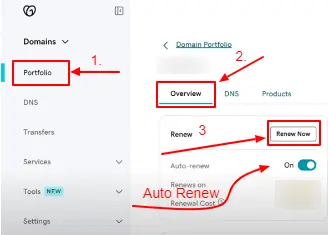
Here, you can view all your domains or use the filter options to find the domain you want to renew.
Now, identify the domain you want to renew: You’ll likely see a list of all your registered domains. Select the specific domain name you wish to renew.
And enable “Auto Renew” if you want auto renewal of the domain.
Step #3: Now, under the overview section, initiate the domain renewal process and click on the “renew” button.
Simply check the box next to the domain you want to renew. Or, if you renew multiple domains at once, check the box next to “Domain Name” and choose “Select All.”
After selecting your domains, click “Renew Now” from the action menu.
- Consider enabling auto-renew to prevent your domain from accidentally expiring in the future.
- This way, you won’t have to worry about interruptions in service.
- Auto-renew uses your stored payment method to renew your domain before it expires automatically.
Step #4: A new popup will open when you click the Renew Now button.
With GoDaddy, you can choose how long you want your renewal period.
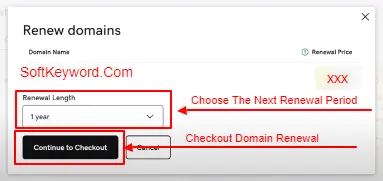
You can pick a term from one year to ten years, depending on what works best for you.
So choose the Domain Renewal Period and Click “Continue to Checkout.”
Step #5: Take a moment to review your renewal details, including the cost and terms, before heading to checkout.
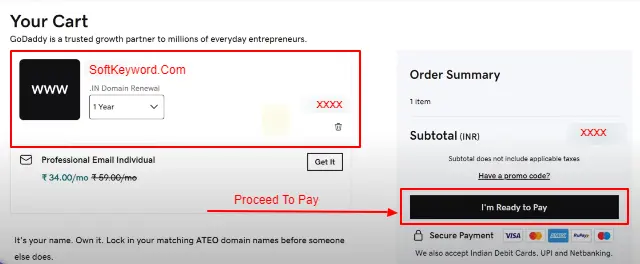
Make sure you’ve selected the correct renewal term and payment method.
Once everything looks good, complete the payment to finalize your domain renewal.
And click “I’m Ready to Pay.”
Step #6: A new tab will open with the confirmation message.

Also, you will get the option to get domain-related updates directly from your WhatsApp number.
Just tick the box, and you will be good to go. You will usually get a confirmation email after your domain renewal is complete. This email will act as your receipt.
How To Renew An Expired Domain Name?
What do you do if your domain has expired (potential redemption fees)?
Renewing an expired domain can differ slightly from the usual steps to renew a domain name.
First, there might be an extra redemption fee on top of the renewal cost
Why? 🤔
Because you’re renewing after the expiration date.
- The domain is still within the renewal grace period (usually 10-30 days after expiry).
- If it’s been longer, then there is no guarantee that you can renew the domain name, which could be up for grabs by anyone.
- Sometimes, the registrar might let you know if the domain is still available for renewal before you go through the steps.
Steps: Other than that, the general process of logging in, selecting the domain, choosing a renewal period, confirming details, and paying should be the same as renewing the current domain name.

Contacting your registrar is always best way to clarify your domain’s status.
If your domain name expired and lost the connection to host the you can again connet the domain to the host with simple steps.
And you can also redirect your domain name if you want.
How To Auto-Renew The Domain Name and Avoid manual task
Auto-renewal is a super handy feature for your domain registration.
Once you set it up, your domain will renew before it expires. Which reduces the risk of accidentally letting your domain lapse and saves you time without remembering renewal dates.
But there are a couple of things to watch out for regarding auto-renewal.
- First, ensure your payment method is current to avoid unexpected charges or service interruptions.
- Also, watch for price changes, as renewal costs could increase. It’s a good idea to check on your renewal costs now and then to stay on top of things.
You just have to follow the same steps for renewing an active domain name.

Check Your Domain Renewal Status to be alert
How will you know your current domain status if the renewal period is near?
There are two main ways to check if it is required to renew your domain name:.
Method #1: The first one is through your registrar’s control panel
- You must Log in to your account with the company where you bought your domain name.
- Look for a section that says something like My Domains or Domain Management.
- Once you find your domain name, you should see details about its registration status, like when it expires and if you can renew it.
- It might say Active, Current, or Renewal Upcoming.

Method #2: The second method is Using a WHOIS lookup service
- The WHOIS database contains information about domain names, such as who the registrar is and when it expires.
- There are lots of free WHOIS lookup services online. You just have to search for [WHOIS lookup].
- Type in your domain name and hit Lookup or Search.
- Look for a section that says Registry Expiry Date or something similar. That’s when your domain expires.
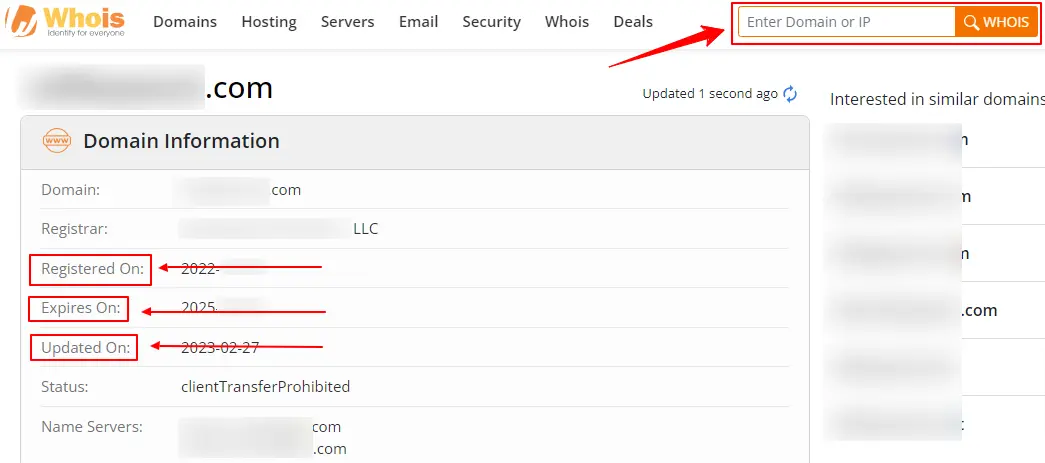
But you just need to remember: A WHOIS lookup won’t tell you if your domain is set to auto-renew; it will just tell you when it expires.
If your domain is expired, a WHOIS lookup might still say it’s registered, but the status could show it’s in a redemption period.
It’s best to check your domain renewal status directly through your registrar’s control panel for the most accurate information.
Alright!
Wrapping Up
Renewing your domain name and ensures your online presence remains uninterrupted. Then also secure your domain name.
By following these steps, you can avoid any potential headaches down the line.
Do you have any questions about renewing your domain name, or have you ever encountered any issues during the process?
Share your thoughts and experiences in the comments below!
